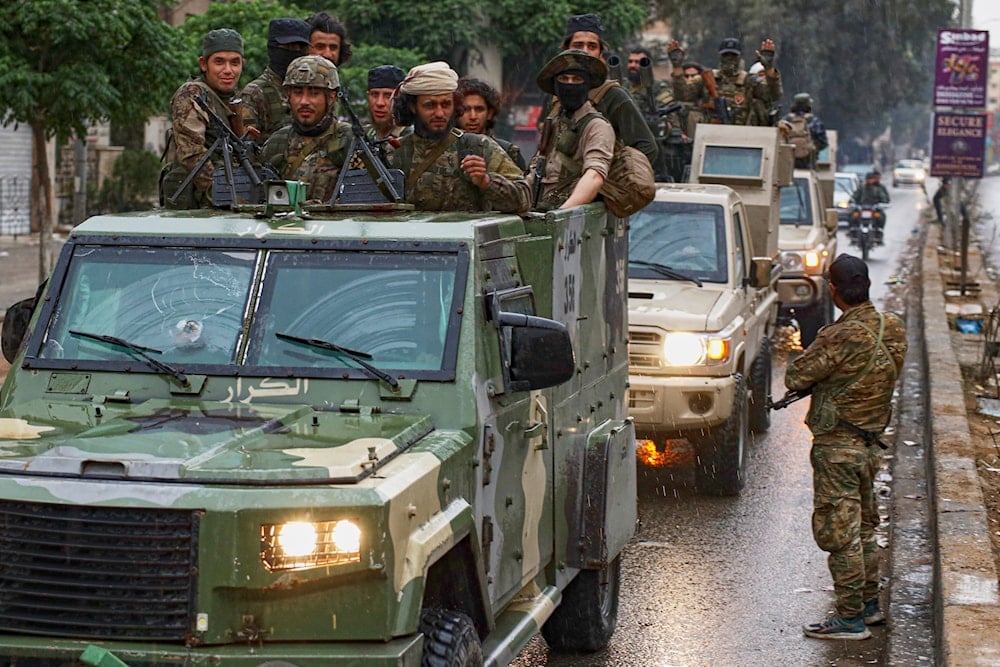Druze in Syria call for international protection amid rising violence
Facing escalating violence in Suweida, the Druze in Syria, led by Sheikh Hikmat al-Hijri, are demanding international intervention, citing state-backed sectarian attacks and broken trust in the government.
-

Members of Syria's security forces deploy in the town of Sahnaya, south of Damascus, on Wednesday, April 30, 2025, after earlier clashes with Druze in Syria. (AP)
The spiritual leader of the Druze in Syria, Sheikh Hikmat al-Hijri, has issued an urgent appeal for international protection following a series of deadly attacks in Suweida and rural Damascus, accusing government-backed militias of perpetrating massacres against his community.
In a public address on Thursday, Sheikh al-Hijri declared, “Requesting international protection is a legitimate right of the people when they are being annihilated by massacres.” He called on international organizations to act immediately to prevent further bloodshed, warning that continued silence would only enable further atrocities.
The appeal follows two days of violence in the Suweida countryside, where armed clashes and killings have left numerous people dead. Al-Hijri said the incidents reflect a broader campaign of targeted violence against the Druze in Syria, comparing them to past massacres on the Syrian coast.
'No trust in the government'
Al-Hijri condemned the Syrian government, stating that it no longer holds the trust of its people. “We no longer trust an entity that claims to be a government, a government does not slaughter its people through its own extremist militias,” he stressed.
He went on to denounce what he described as a state-sponsored campaign of sectarian violence. “They are mere instruments of death, bloodshed, kidnapping, and the distortion of truth through sectarian and takfiri thinking,” he added.
The Druze leader emphasised that his community has never operated as a militia and does not engage in violence, describing the recent killings as part of an "unjustified genocide campaign."
Sectarian killings escalate in Suweida countryside
Al-Hijri's comments come amid growing concern over sectarian violence in Syria, particularly in the Suweida region, where the Druze community has historically maintained a degree of autonomy and neutrality.
According to local reports, heavily armed groups linked to Syrian government militias have attacked unarmed civilians in what al-Hijri described as coordinated massacres. He accused the attackers of acting under a takfiri ideology that targets not only minorities but also moderate Sunni Muslims.
Parallels drawn with coastal massacres
Drawing historical parallels, Sheikh al-Hijri referenced past atrocities on the Syrian coast that went unpunished and largely ignored by international actors. “We are living through the same experience now and are asking for urgent, direct international support,” he stated.
He argued that the evidence of these crimes is clear and well-documented, calling into question the effectiveness of international investigative committees and urging immediate action instead.
Despite the gravity of the situation, al-Hijri reaffirmed his community’s commitment to peaceful resistance and a future Syria built on justice and inclusivity. He called for a “modern, civil, decentralized” government that respects all citizens regardless of sect, and one that does not rely on exclusion or repression to govern.
“We are still waiting for our fellow citizens across this homeland to bring forth a constitution that upholds justice and fairness,” he said.
Unfolding the story
Clashes continued to intensify across southern Syria this week, particularly in the Damascus countryside, despite the announcement of a preliminary ceasefire in select areas.
Fighting erupted overnight on Thursday on the Kanaker front, with local sources confirming to Al Mayadeen that heavy gunfire and mortar shelling struck the village.
By dawn, local factions reportedly repelled an armed assault by militant groups, successfully halting the offensive although intermittent gunfire persisted.
The latest confrontation follows several days of deadly unrest in southern Damascus. On Tuesday, violence broke out between government-backed armed groups and local residents in Jarmana and Ashrafiyet Sahnaya, resulting in approximately 70 fatalities. The dead included civilians, armed factions, and members of Syria’s General Security Force.
The conflict was initially triggered by the leak of an audio clip containing insults directed at Prophet Muhammad. Although Druze religious leaders swiftly denounced the content, the unrest persisted.
As the security situation deteriorated, authorities announced a ceasefire agreement in Jarmana and Ashrafiyet Sahnaya late Wednesday. The announcement followed a high-level meeting involving governors from the Damascus countryside, Suweida, and Quneitra, along with Druze sheikhs from Sahnaya.
Syrian Information Minister Hamza Mustafa accused "Israel" of taking advantage of the internal instability. “Israel is trying to play the sectarian card to gain a foothold in Syria as part of its ongoing plans,” he warned.
Mustafa reaffirmed that “Syrian Druze are an inseparable part of Syria and have contributed significantly at many pivotal moments in the country’s history.”
The situation remains tense, as local communities and authorities work to contain the violence and prevent further external interference in Syria’s internal affairs.

 5 Min Read
5 Min Read










